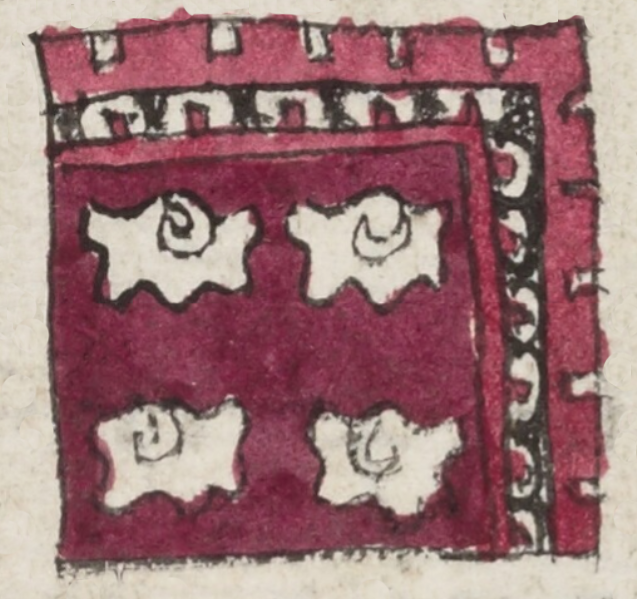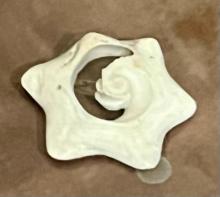yecacozcayo (Mdz64r)
This iconographical example is intended to show a cutaway or section view of a shell design (yecacozcayo, in our Online Nahuatl Dictionary, but perhaps it should be spelled ecacozcayo or ehecacozcayo. This design appears to reveal the inner coil of a conch. The shell is white, with scalloped edges. The surrounding background is red.
Stephanie Wood
The art historians of Mesolore identify this as a "cut shell" design on a cape found in the Matrícula de Tributos, a precursor to the Codex Mendoza. The elements of the word yecacozcayo include eca- or eheca-, the stem for ehecatl, wind, plus cozca-, the stem for cozcatl, necklace, knowing that shells were used for necklaces, and -yo, from -yotl, having the nature of. The intrusive y- before -eca is not unusual. Two examples of shells below are different shells from this one. The ilacaztli and tecciztli are closer. The cutaway views of shells can reveal the inner swirls and connect them to thoughts of whirlwinds and whirlpools (movement).
Stephanie Wood
c. 1541, or by 1553 at the latest
This cross-section of a conch shell resembles the yecacozcayo, above. The museum signage refers to it as “Echecailacacozcatl” [sic]. What should be the eheca- start to the term refers to the swirl (like a whirlwind), while the rest of the term refers to a shell necklace. The iconographic example above may in fact be either the ecacozcayo or the ecailacacozcatl. It is not highly unusual to have the term ecatl or ehecatl have an added “y” at the start, such as appears in a few glossed name glyphs, Yecatl, where the imagery points to the divine force, Ehecatl. Museo Nacional de Historia, Chapultepec Park, Mexico City. Photo by S. Wood, 29 April 2025.
yecacozcayo, a cut shell design, https://nahuatl.wired-humanities.org/content/yecacozcayo
eca(tl), air, breath, https://nahuatl.wired-humanities.org/content/ecatl
eheca(tl), wind, https://nahuatl.wired-humanities.org/content/ehecatl
cozca(tl), necklace, https://nahuatl.wired-humanities.org/content/cozcatl-0
-yo(tl)-, having that characteristic or quality/inalienable possession, https://nahuatl.wired-humanities.org/content/yotl
Codex Mendoza, folio 64 recto, https://digital.bodleian.ox.ac.uk/objects/2fea788e-2aa2-4f08-b6d9-648c00..., image 138 of 188.
Original manuscript is held by the Bodleian Libraries, University of Oxford, MS. Arch. Selden. A. 1; used here with the UK Creative Commons, “Attribution-NonCommercial-ShareAlike 3.0 License” (CC-BY-NC-SA 3.0)





